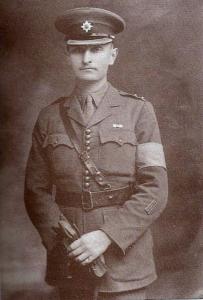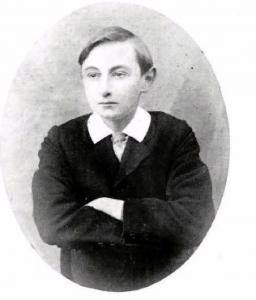
|

|
| Lieutenant Robert Henry Warren HEARD MC and Bar | |
|
No. 4 Company, 2nd Battalion Irish Guards Date of birth: 6th March 1895 Date of death: 3rd March 1919 Died of wounds aged 23 Buried at St Multose Churchyard, Kinsale in Eire |

|
| Robert Henry Warren Heard was born at Pallastown, Kinsale County Cork on the 6th of March 1895 the only son of Robert Wilkes Heard JP, landowner, and Charlotte Amyand Powys (nee Adams later Pratt) Heard of “Sandycove”, Fisher Street, Kinsale in Ireland. He was educated at Streete Court School, Westgate-on-Sea and at Lancing College where he was in Heads House from January 1910 to April 1913 where he served as a Private in the Officer Training Corps until April 1912. Following the outbreak of war he applied for a commission in the Special Reserve of Officers on the 17th of August 1914 and was commissioned as a 2nd Lieutenant in the Irish Guards on the 15th of August 1914. At a medical examination, which was held at Queen Alexandra's Military Hospital, Millbank on the 19th of August, it was recorded that he was five feet eight inches tall and that he weighed 130lbs. On the same day he attended an interview at Wellington Barracks. He was posted to the 1st Battalion of his regiment and embarked for France on the 1st of May 1915, joining his battalion in the field the following day. On the 18th of May the battalion attacked German trenches at Cour l'Avoine Farm near Festubert. The Guards managed a 300 yard advance but suffered casualties of thirteen officers and three hundred and ninety two other ranks. Robert Heard had been left behind for this attack but on the 19th of May he joined No. 1 Company to replace their losses. He was promoted to Lieutenant on the 20th of September 1915. On the 7th of October 1915 he was wounded in the right shoulder and the left thigh, along with three other men, while supervising work in the trenches near Vermelles. He was evacuated from Rouen on board the Hospital Ship "St Andrew" on the 15th of October 1915 and landed at Southampton the following day. A Medical Board was convened at Caxton Hall, London on the 21st of October to report on his condition: - "The Board finds that he received two wounds from rifle bullets- 1. The first one entering the top of the R shoulder above the clavicle passing through and emerging above the scapula. Both punctures healed. 2 The second entering the region of the groin to the left of the penis & making its exit through the centre of the left buttock injuring no structures of importance in its course, puncture wounds both healed." While he was recovering he applied for a permanent commission in the Irish Guards on the 3rd of November 1915 and was granted his commission on the 4th of January 1916. He was found to be fit for general service at a Medical Board which was held at the Military Hospital, Cork and he joined the 3rd (Reserve) Battalion of his regiment on the 28th of May 1916. He returned to France in September 1916 where he was posted to the 2nd Battalion, joining them on the 30th while they were resting at Trones Wood on the Somme. He was attached to No. 4 Company and later became their Company Commander. In December 1916 he was taken ill, suffering from the atrocious conditions at the front and left the battalion on the 1st of January 1917. On the 23rd of January he was evacuated from Rouen on board the Hospital Ship "St Patrick", landing at Southampton on the following day. On the 1st of February 1917 a Medical Board sat at Caxton Hall in London to consider his case: - "He has served in France several months & was wounded by G.S.Ws in 2 places at Loos. Towards the end of December 1916 he began to have a bad cough for which he went sick on Dec 30th & was seen by the M.O. who sent him to hosp & then home. Present state, all signs of bronchitis have cleared up but he is very debilitated." A Medical Board held at the Central Military Hospital, Cork held on the 26th of March 1917 passed him as being fit for light duty and a Board which sat at the Military Hospital, Wharley on the 31st of May 1917 found him to be fit for general service. He saw heavy fighting with the battalion during the German spring offensive of March 1918 for which he was awarded the Military Cross the citation of which was announced on the 26th of July 1918 :- “For conspicuous gallantry and devotion to duty at Ervillerd on the 25th of March 1918. Whilst he was relieving another unit in the front line, the enemy attacked and broke through on the right, leaving the flank of this officer’s company exposed. He immediately placed the men, himself being under heavy machine gun fire, to form a defensive flank and rectified the situation.” He was awarded a Bar to his Military Cross which was announced by the War Officer on the 3rd of June 1918:- “During the attack on the Broembeck on the 9th of October 1917, this officer was in command of a company of the leading wave. He led his men with conspicuous ability and throughout the action displayed the greatest bravery and initiative,. This officer’s splendid courage and fearlessness in face of danger had been a great example to all.” The service for which the award of the Bar was made covered a period of nine months during which time the original recommendation was under consideration. His Commanding Officer had the power to grant certain “immediate” awards in addition to submitting recommendations for approval. He was conferred with a Bar to his Military Cross after he had died for a specific act of bravery which is why it is described as a Bar even though it was for an earlier action. On the 21st of April 1918 he was gassed in the Nieppe Forest and was evacuated from Boulogne on the 29th of April, landing at Dover the following day. A Medical Board was convened on the 3rd of May 1918 at the Prince of Wales' Hospital for Officers, Marylebone to consider his case: - "The Board finds that when in action on 21-4-18 he was gassed by shell gas & had conjunctivitis, vomiting, cough & bronchitis. The eyes are still blistered & irritable. There is cough and irritation of the nasal mucous membrane." He was passed as fit by another Medical Board on the 20th of October 1918 and was ordered to report to the London Command Depot at Shoreham. He died on the 3rd of March 1919 at the Military Hospital in Purfleet from septic pneumonia following the gassing he had received at the front nearly a year earlier. He was mentioned in despatches twice. His mother applied for his medals in April 1920 |
|
 | |
| Heads House |
Back